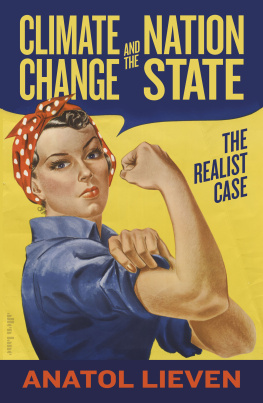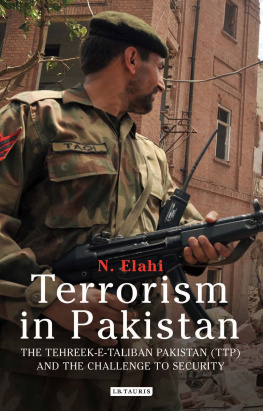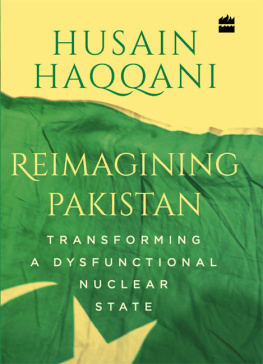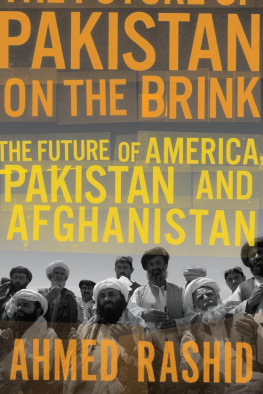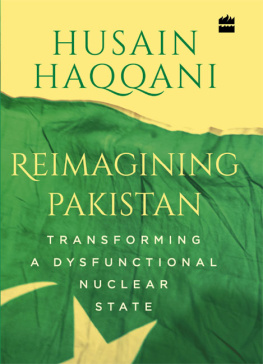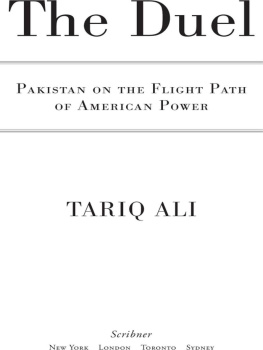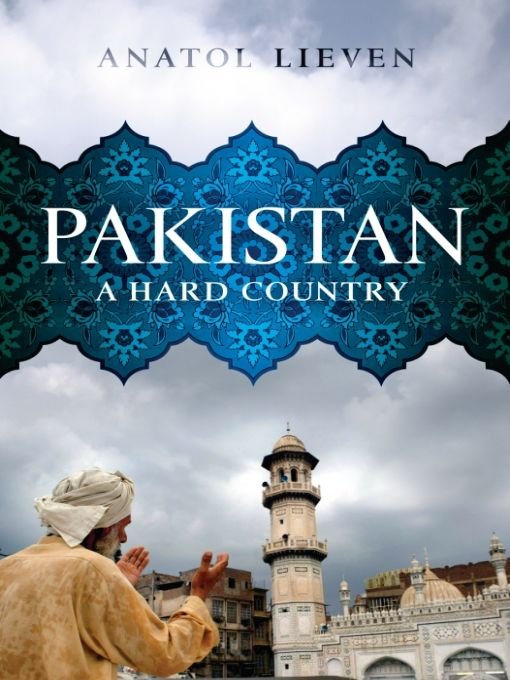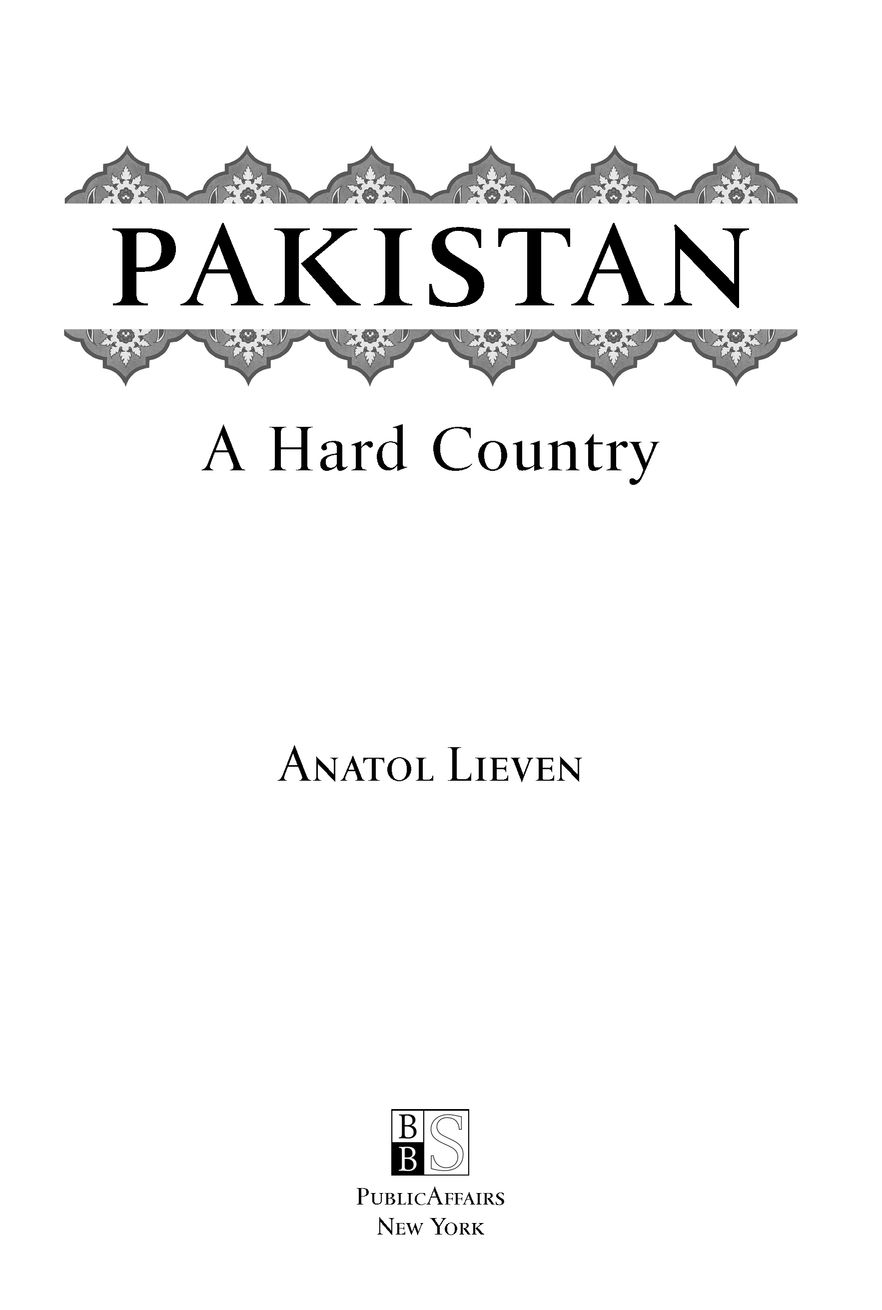Table of Contents
In memory of my grandparents,
George Henry Monahan,
Indian Civil Service
Helen Monahan (ne Kennedy)
and their son,
Captain Hugh Monahan MC,
5th Royal Gurkha Rifles (Frontier Force)
and in honour of their successors in the civil and military
services of Pakistan, India and Bangladesh
Acknowledgements
This book would not have been possible had it not been for the immense kindness and hospitality of many Pakistanis, who invited me to their homes and talked to me frankly about their lives and their opinions so many that the great majority will have to go unthanked.
I am especially indebted to Ashraf and Ambrin Hayat and their family in Islamabad. I hope that my prolonged stays with them did not disrupt their lives too much.
Syed Fakr Imam and Syeda Abida Hussain have been most gracious hosts over the years in their various residences, and shared with me their knowledge of politics, history and culture. Najam and Jugnu Sethi have been good friends and kind hosts for an equal time. Naeem Pasha and Kathy Gannon have entertained me more often than I can remember, and Kathy has shared her incomparable knowledge of matters Afghan. Naveed and Saeed Elahi have both given most generously of their time and helped me enormously with advice, information and contacts.
Whether in official service or the media, Maleeha Lodhi has been unfailingly kind, helpful and insightful. Her comments on parts of the manuscript were extremely valuable. I must also thank Shuja Nawaz, Asad Hashim and Hasan-Askari Rizvi for their comments. Of course, responsibility for the contents of this book, and the opinions expressed in it, is entirely my own. Among legions of Pakistani journalists and analysts who have helped me over the years, I must especially mention my old colleague Zahid Hussain, together with Zafar Abbas, Ejaz Haider, Imran Aslam, Behrouz Khan and Mosharraf Zaidi.
In Peshawar, I am most grateful to Rahimullah Yusufzai for all his help, and to Amina Khan and her family, to Brigadier Saad, Brigadier Javed Iqbal, Khalid Aziz, and Fakhruddin Khan. It was also most kind of General Zafrullah Khan and the Frontier Constabulary to invite me to stay in their mess in Peshawar in the summer of 2009. Similarly, I must thank the Vice-Chancellor of Faislabad Agricultural University, Professor Iqraar, for inviting me to speak there and putting me up at the university guest house, Dr Faisal Zaidi and the staff of Broomfield Hall in Multan for inviting me to speak there, Dr Mohammed Amir Rana and the staff of the Pakistan Institute of Peace Studies and Ambassador Tanvir Khan and the Institute of Strategic Studies in Islamabad. I am also most grateful to Professor Ali Khan Shehriyar, Dr Lukas Werth, Dr Shandana Mohmand and their colleagues at the Lahore University of Management Sciences for inviting me to speak, offering very helpful comments on my work and sharing their knowledge of Pakistani society.
General Athar Abbas, Colonel Haidar Malik, Captain Nasireh and other officers of Inter-Services Public Relations helped me greatly by arranging a whole series of meetings with senior military figures. Colonel Ali Awan and Mrs Saira Ahmed of the Pakistani High Commission in London helped not only with meetings but with extremely valuable advice. I am grateful to them and all the officers and men of the Pakistani armed forces who have helped me over the years.
In Sindh, I am deeply grateful to Sardar Mumtaz Ali Bhutto and his family for two very pleasant and interesting stays separated by twenty years, and in particular for inviting me to the boar hunt described in this book; and also to Ellahi Baksh Soomro and other members of the Soomro family for a fascinating stay with them in 1990. The Mayor of Karachi, Mustafa Kemal, gave generously of his valuable time. In Quetta, Nawabzada Aurangzeb Jogezai and Ashfaq Durrani very kindly entertained me in their homes.
I could also not have written this book without the help of assistants and translators in different parts of Pakistan. I am grateful to Zuhra Bahman not only for her help, but also for her familys hospitality. Watching Russian television in Peshawar during the Georgian Russian war of 2008 was a somewhat surreal experience, but one worth remembering. I am also deeply grateful to Tauseef-ur-Rehman of The News, whose insights and contacts in Peshawar helped me enormously. Similarly, to Hasan Kazmi in Karachi, Naeem Daniel of Reuters in Quetta, Ali Gardezi in Multan, and Furrukh Khan and Hirra Waqas in Lahore, who also translated pieces from the Urdu media for me, and to Liz Harris in London.
In Britain, Sir Hilary Synnott, Colonel Christopher Langton, Dr Marie Lall and Dr Stephen Lyon provided me with help and advice. In the US, Joshua White helped me with his unparalleled insights into Islamist politics in the North West Frontier Province, as did Stephen Tankel with regard to Lashkar-e-Taiba. Lynne Tracey of the US Consulate in Peshawar kindly invited me on a number of occasions. Khatib Alam and Gul Hafeez Khokar of GHK Consulting helped me with advice, introduced me to Faisalabad and impressed me with their achievements in helping to improve administration in that city. This was also true of Riaz Kamlani, Colonel Anwar Awan and the staff of the Citizens Foundation in the area of education; while the devoted humanitarian service of the staff of the Edhi Foundation has been an inspiration since I first met them more than twenty years ago.
I remain grateful to The Times for sending me to Pakistan and Afghanistan in 1988 and allowing me to lay the foundation for this book, and to the Carnegie Endowment for International Peace, the New America Foundation, Bill Benter, the Nuffield Foundation, the Leverhulme Trust and the British Academy for financing different parts of my research in Pakistan from 2001 to 2009.
My thanks are due to my colleagues in the War Studies Department of Kings College London for their support, in particular to Professor Mervyn Frost for his kindness in sparing me some administrative duties during the period of researching and writing this book, and to Dr Rudra Chaudhuri, whose insights into Indian policy and generosity in taking over lectures and seminars were a great help in a very busy time.
I am most grateful to Simon Winder, Caroline Elliker and the staff at Penguin for their great helpfulness and patience in what at times (through no fault of theirs) was a difficult editorial process, to Janet Tyrrell for spotting and correcting mistakes and infelicities, and to Clive Priddle and his colleagues at Public Affairs in the US. Natasha Fairweather, Emily Kitchin and Donald Winchester at AP Watt have as always been an indispensable help.
My wife Sasha bore the whole burden of the family during my long absences in Pakistan, and my son Misha absorbed a large amount of (antique) Pakistani weaponry without turning any of it on his father. I hope that before too long they will be able to visit Pakistan with me in more peaceful times.
Acronyms
| ANP | Awami National Party, the Pathan nationalist party led the Wali Khan dynasty. |
| ASI | Assistant Sub-Inspector; a junior police officer. |
| BJP | Bharatiya Janata Party (India). |
| COAS | Chief of Army Staff. |


